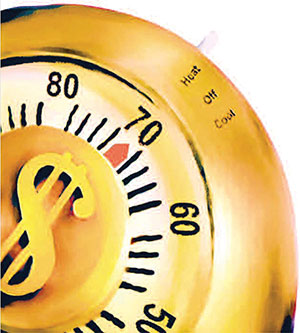Frigid temperatures cause student utility bills to rise

Illustration by Michael Hogue/The Dallas Morning News
February 17, 2014
Lisa Sajka, a junior managerial marketing major, saw her gas bill increase by more than $100 since the beginning of the school year.
“In November it was $172; normally it’s like $30 to $50,” Sajka said, who lives in a house on Summit Street. “In January, it was $222.”
Sajka and other Kent State students who live off campus have seen a considerable increase in their gas bills as temperatures have dropped to the single digits this winter. The Energy Information Administration (EIA) estimated that more than 90 percent of the 116 million homes in the United States will have higher heating expenditures this winter compared with last winter.
“The cold weather has tacked on about $100 to our heating bill,” Brandon Boling, a junior sociology major, who tries to avoid turning the heat up by using a lot of blankets said.
Many cities across Northeast Ohio, including Kent, experienced some of the coldest days in history two days in a row in January, according to the National Weather Service.
Caitlin Smith, senior integrated health sciences major, said her gas bill increased about $65 in January.
“Now we keep our heat a little bit lower, and we shut our bedroom doors to keep the living room and kitchen warm,” Smith said.
The cold weather caused high storage withdrawals of natural gas to heat up homes and businesses making it the highest withdrawal in the last twenty years according to the EIA.
Alison Vartley, a leasing consultant at Jordan Court apartments, recommends students keep the temperature of their house or apartment around 70 degrees.
“A lot of students will put it at 80 degrees, but it doesn’t necessarily help,” Vartley said.
Adam Kurka, comfort advisor at Jennings Heating and Cooling Company, said maintaining and cleaning your furnace equipment makes a huge difference.
“Your equipment is working really hard to provide heat and if you do not take care of it, it will have to work even harder, and this will cause your bill to rise,” Kurka said. “Every house is different.”
Contact Breyanna Tripp at [email protected].
























